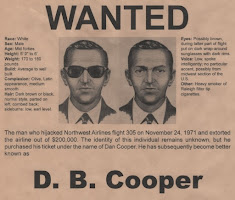 |
| D.B. Cooper...or whatever... |
Do not
look for him
In
brittle mountain streams
And do
not examine the angry rivers
For shreds
of his body
Or turn
the shore stones for his blood
But in
the warm salt ocean
He is descending
through cliffs
Of slow
green water
And
hovering colored fish
Kiss his
snow-bruised body
And
build their secret nests
In his
fluttering winding-sheet
-
Leonard
Cohen
-
He hails from 1971 but the vibe is sooo 60s. He’s Clyde Barrow with a parachute. He’s Randle McMurphy escaping into the midnight trees. Nobody really knows anything about D.B. Cooper, except that he hijacked a Boeing 727, got $200,000, and jumped out at 10,000 feet with a parachute over southwest Washington State. Pitch black. Raining. Never seen or heard from again. No body. No parachute. Nada. The snake eats its tail.The crime remains the only unsolved air piracy in commercial aviation history. It’s driven people crazy. Thousands of books and articles have been written. There are a million theories. Why? Ask yourself why?
The FBI has given up. Exhausted after decades of futility... He’s gone baby gone, this black-feathered defrocked angel that ordered a bourbon and soda, stared out the plane’s window, then vanished forever into the night, as if he was never there; as if he never existed. He is Camus’ Meursault, but more than an outsider—someone who has no need for terra firma; a fading phantom who cannot be traced through corporeal stigmata.
They could never find him because they were always looking down.
This narrative is clearly airborne. It
has to do with winding jet streams and falling into the sky and holding onto the back of that silent condor as it
sweeps up to the moon and brushes heaven’s gate with a landing light.
#dbcooper #hijack #cult #criminal #1971 #boeing #popculture




